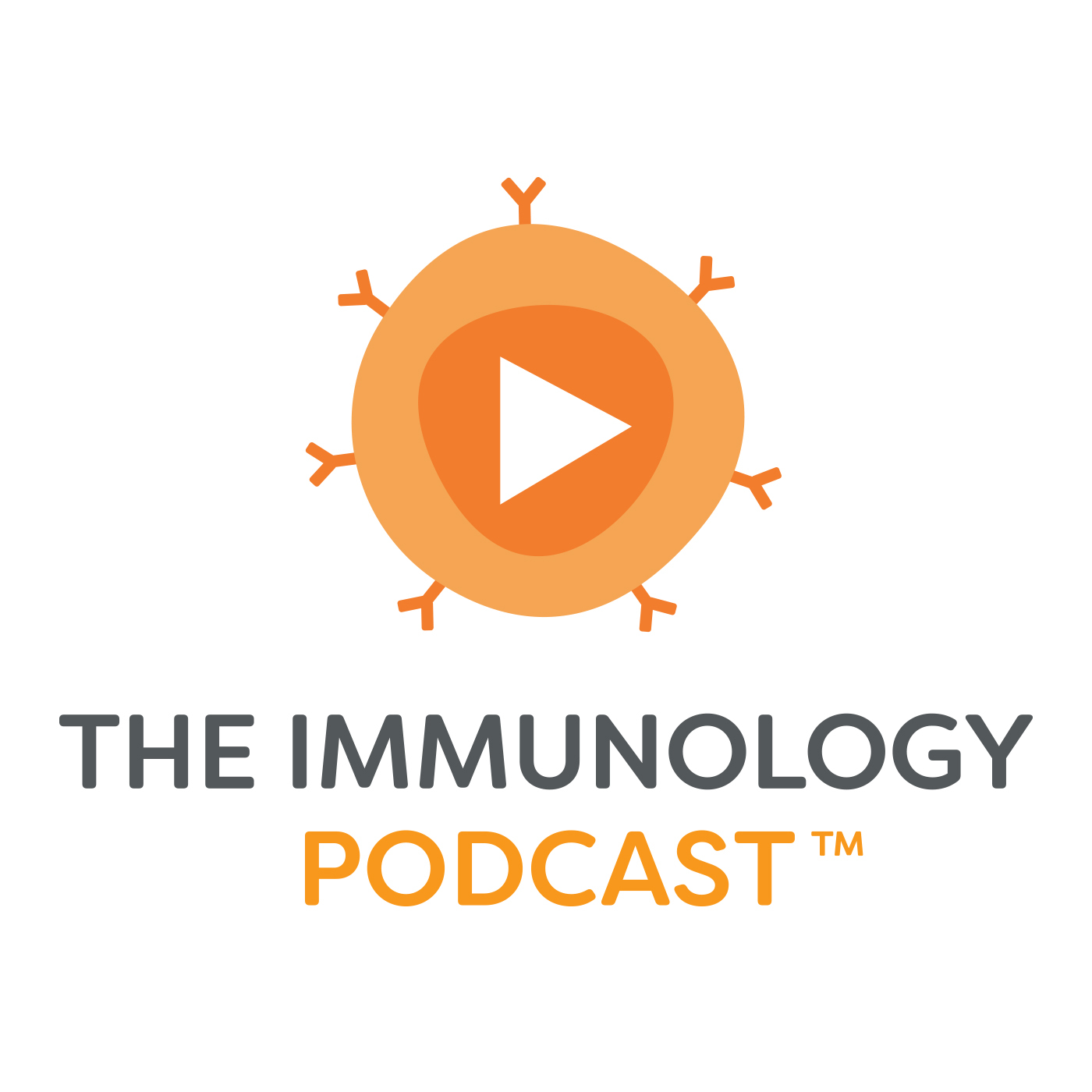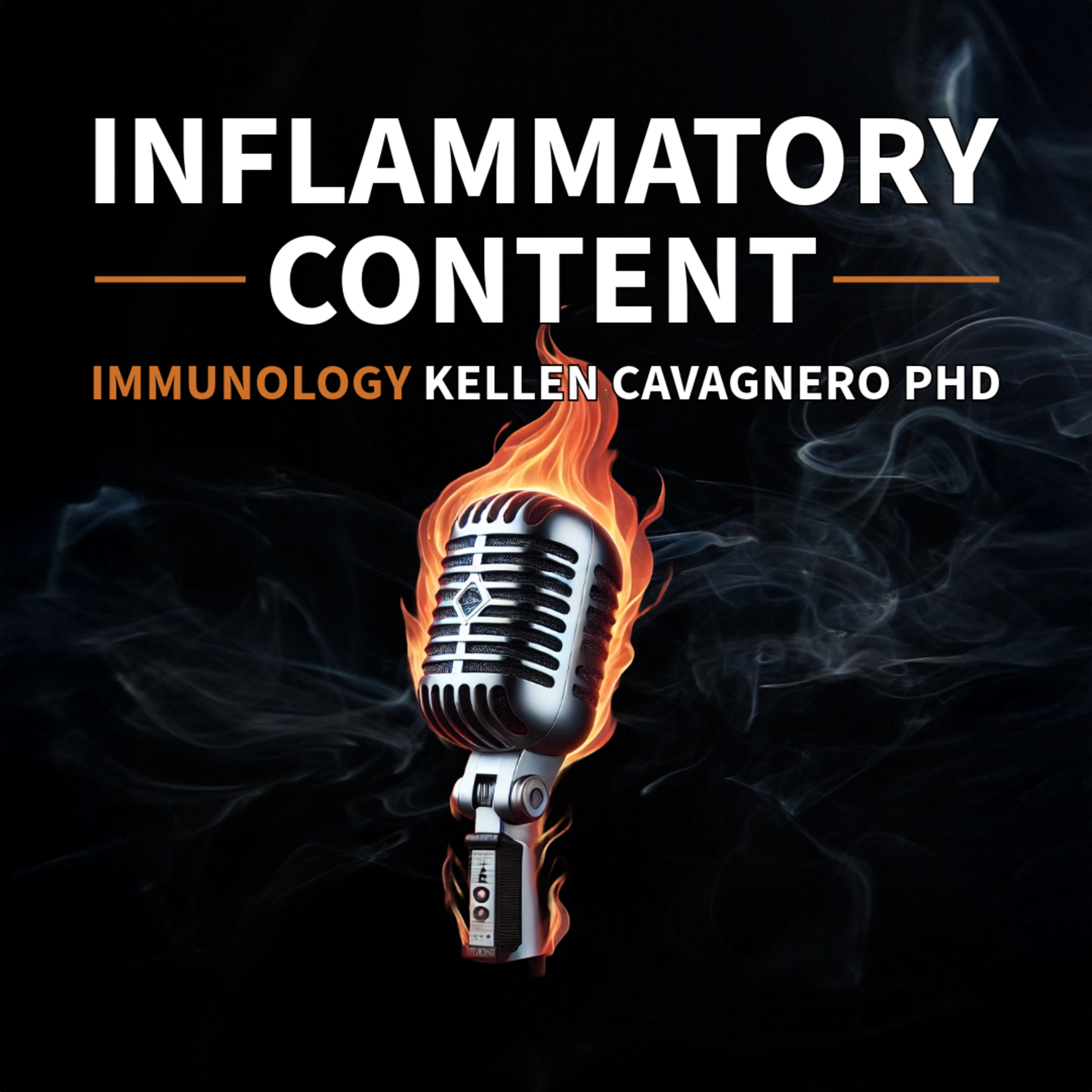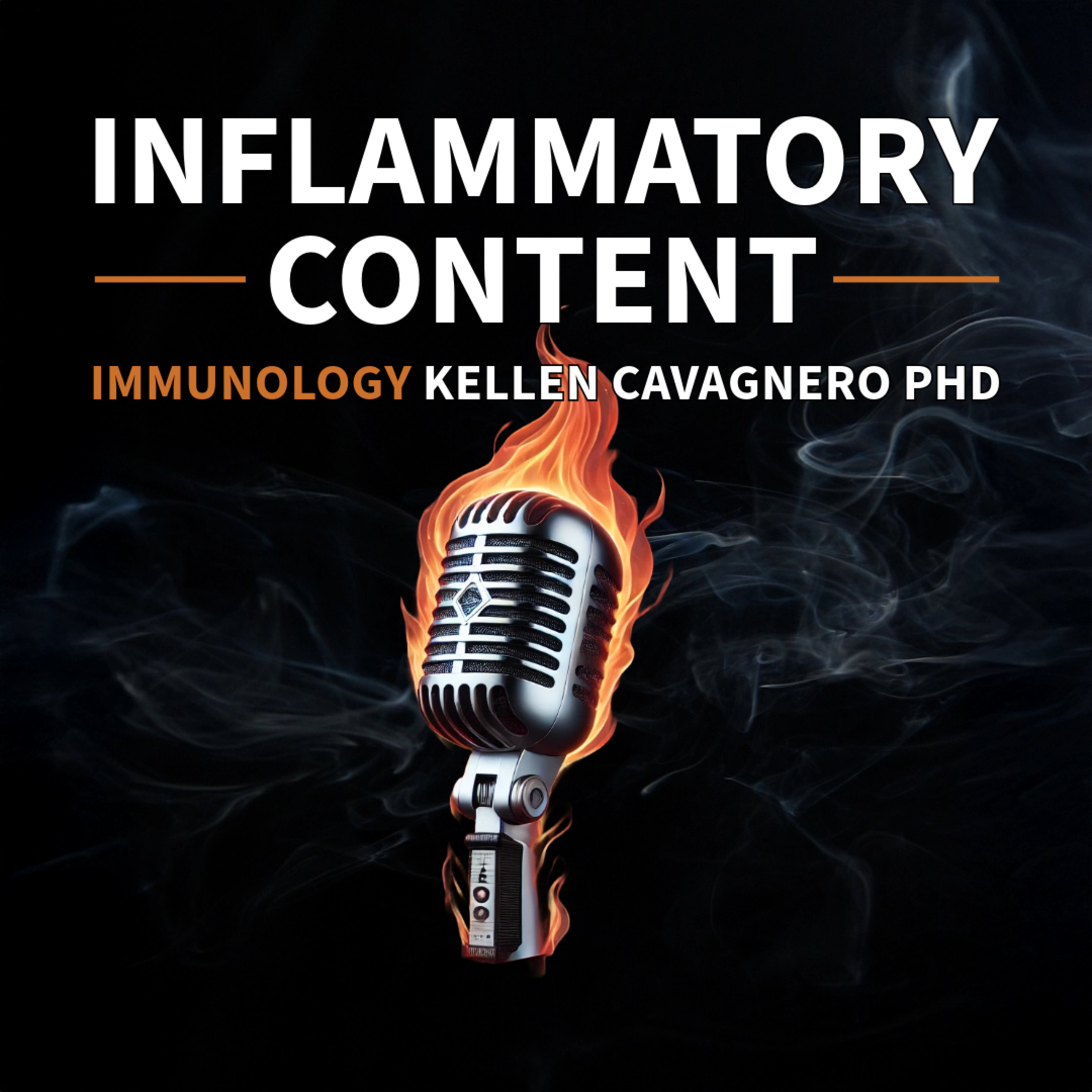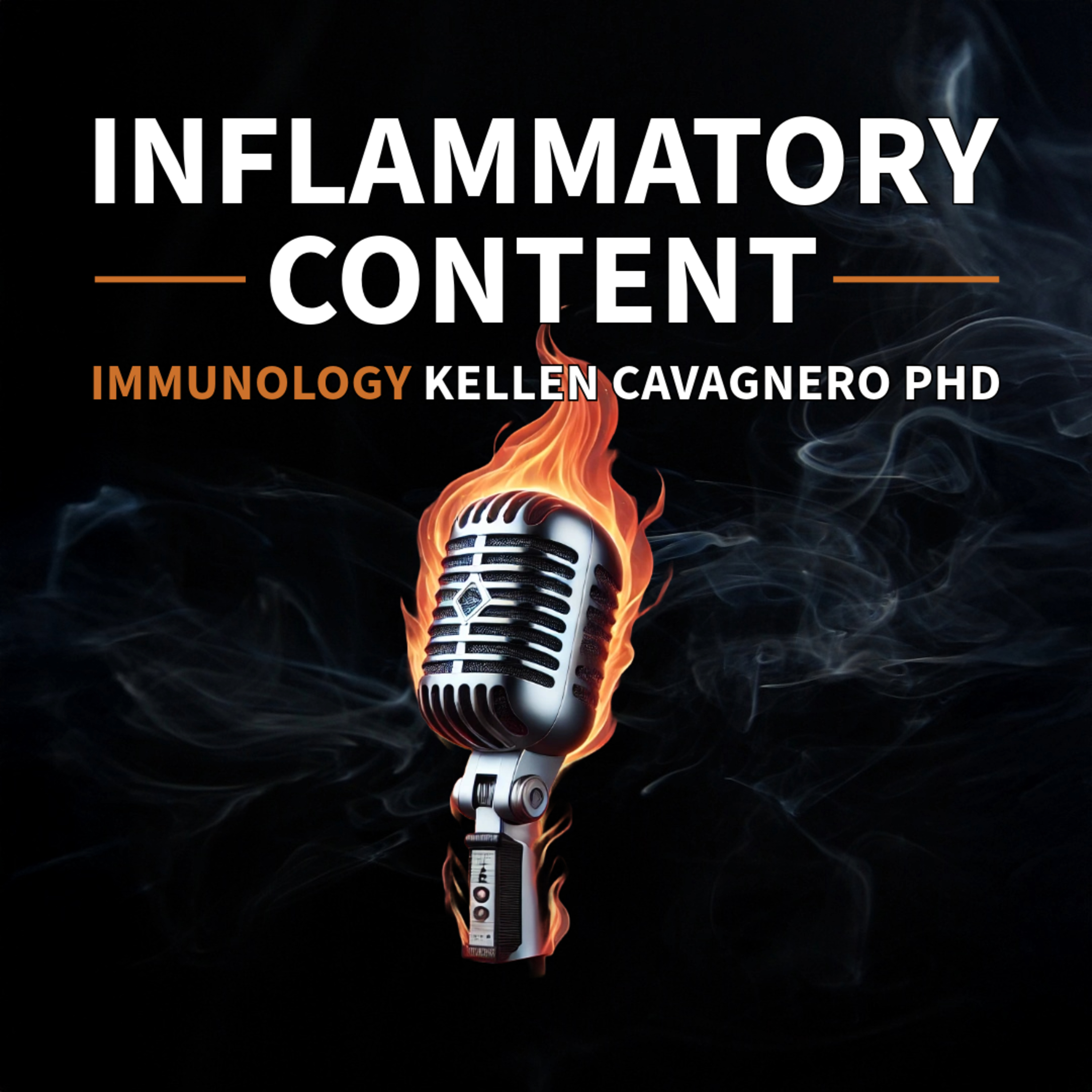Shows

Inflammatory Content#28: Hidradenitis SuppurativaIn this episode of Inflammatory Content, Dr. Kellen Cavagnero explores the debilitating skin disease hidradenitis suppurativa (HS) and takes a deep dive into a recent Immunity paper that comprehensively examines the role of tertiary lymphoid structures in HS pathogenesis. HS has long defied simple classification, with prevailing disease models emphasizing hair follicle dysfunction, aberrant wound healing, or chronic inflammation. This work adds a new dimension by implicating autoimmunity as a central contributor to HS pathogenesis, further underscoring the complexity of the disease.Relevant Links:• Paper: https://pmc.ncbi.nlm.nih.gov/articles/PM...
2026-01-0439 min
Inflammatory Content#27: A Surprising New Role for Neutrophils in Wound HealingIn this episode of Inflammatory Content, Dr. Kellen Cavagnero breaks down a new Nature paper showing that a subset of skin neutrophils doesn’t just fight bacteria—they also build extracellular matrix (ECM). After injury, these neutrophils rapidly assemble rings of ECM around the wound that strengthen the barrier and limit bacterial entry. This program depends on TGF-β signaling within neutrophils; when that pathway is disabled, the rings fail to form and bacteria penetrate more easily. Relevant Links:• Paper: https://pubmed.ncbi.nlm.nih.gov/40108463/• Commentary: https://www.nature.com/articles...
2025-08-2029 min
Inflammatory Content#26: Spatial Proteomics Uncovers a Lifesaving Treatment for Severe Skin Drug ReactionsIn this episode of Inflammatory Content, Dr. Kellen Cavagnero dives into a landmark 2024 Nature study by Thierry Nordman and colleagues, titled “Spatial proteomics identifies JAKi as treatment for a lethal skin disease.” This cutting-edge research changes the game for patients suffering from toxic epidermal necrolysis (TEN)—a devastating cutaneous adverse drug reaction with limited treatment options.Using a powerful approach including spatial proteomics and mouse models of TEN, the authors identify interferon signaling as a key inflammatory pathway driving TEN. Most remarkably, they repurpose an FDA-approved JAK inhibitor to safely and effectively treat patients with T...
2025-07-0518 min
Inflammatory Content#25: Immuno-endocrinology with Dr. Dequina Nicholas, Ph.D.In this episode, Dr. Kellen Cavagnero is joined by Dr. Dequina Nicholas. Dr. Nicholas is an Assistant Professor at the University of California Irvine in the Department of Molecular Biology and Biochemistry. Her laboratory studies endocrine diseases, including type 2 diabetes and polycystic ovary syndrome. Specifically, her group investigates the intersection of the nutrient environment, the immune system, and metabolic disease using a combination of molecular and cellular biology, transgenic mouse models, cytokine profiling, and flow cytometry. Dr. Nicholas is the recipient of numerous awards including the NIH Director’s New Innovator Award. In their conversation, Kellen and De...
2025-03-081h 09
Inflammatory Content#24: AI Generated Podcast on Immune-Acting FibroblastsToday we’re going to do a journal club, but it will not be your run of the mill journal club. Everyone who knows me knows I am always searching for the latest technology that can increase my efficiency. Lately, I have been especially attuned to the newest developments in artificial intelligence.Well, I recently discovered a new AI tool by Google called NotebookLM that creates audio overviews of documents. What this means is that it will--within minutes--create a journal club podcast if you upload a research article. It is BANANAS! There are a few minor instances wh...
2025-01-1632 min
Inflammatory Content#23: The PhD Fellowship Application Survival GuideOne of the most common questions I get from undergraduate and graduate students is: How do I get a Ph.D. fellowship? During my Ph.D., I was fortunate to be awarded two fellowships, and I’ve received two more as a postdoc. In this solo episode, I provide an overview of the who, what, where, when, why, and how of Ph.D. fellowship applications, with the goal of helping you secure a fellowship to support your research. Please reach out to me if you would like the PowerPoint version of The Ph.D. Fellowship Application Survival Guide. ...
2024-11-3028 min
Inflammatory Content#22: Mpox (formerly monkeypox) with Dr. Aaron Oom, Ph.D.In this episode, Kellen is joined by Dr. Aaron Oom, a Postdoctoral Scholar in the lab of Dr. Mark Mulligan at NYU Langone Health. Aaron is an expert in virology and immunology. He completed his Ph.D. in the lab of Dr. John Guatelli’s at UC San Diego. Aaron has made significant contributions to our understanding of viruses including HIV, Zika, and Dengue. Now, as a Postdoctoral Scholar in the Mulligan lab, he’s focused on Mpox (formerly known as monkeypox), which has recently re-emerged as a major global health threat. In this conversation, Kellen and Aaro...
2024-10-261h 11
Inflammatory Content#21: Functional genomics identifies a novel therapeutic target for inflammatory bowel diseaseGenome-wide association studies (GWAS) have identified thousands of disease-associated genetic variants. Many of these variants lie in non-coding regions of the genome, making interpretation of GWAS difficult and leading to poor translation into therapeutics. In this episode, Kellen reviews an exciting original article published in Nature in June 2024 titled, “A disease-associated gene desert directs macrophage inflammation through ETS2”. Here, Stankey et al. use a cutting-edge functional genomic strategy to identify a novel therapeutic target for the treatment of inflammatory bowel disease. Paper: https://pubmed.ncbi.nlm.nih.gov/38839969/To help us spread science, please consider writ...
2024-08-2633 min
The Immunology PodcastEp. 79: “ILC2s, the Microbiome, and Fibroblasts” Featuring Dr. Kellen Cavagnero
Guest:
Dr. Kellen Cavagnero is a Postdoctoral Fellow at the University of California, San Diego. His PhD work focused on how fibroblasts — a cell type thought to be immunologically inert — contribute to chronic inflammatory conditions and defense against pathogens. He talks about staph infections, antimicrobial resistance, and the types and roles of fibroblasts. He also discusses his work in science communication, including his podcast, Inflammatory Content.
Featured Products and Resources:
Read more interviews with immunologists in STEMCELL’s ‘Immunology Profiles’ series.
Scale up your cell isolation with the Easy 250 EasySep Magnet.
The Immunol...
2024-06-041h 09
Inflammatory Content#20: Cancer, Metabolism, T cells, and Spatial Transcriptomics with Dr. Miguel Reina-Campos, Ph.D.Dr. Miguel Reina-Campos is an Assistant Professor at the La Jolla Institute for Immunology in La Jolla, California. The Reina lab seeks to understand the underlying principles governing tissue immune networks that enable robust and long-term protection against infection and tumors.In this conversation, Miguel and Kellen talk about cancer, metabolism, tissue resident memory T cells, spatial transcriptomics, advice for postdocs pursuing academia, and much more.Reina Lab: https://www.lji.org/labs/reina-lab/Reina BioRxiv 2024: https://pubmed.ncbi.nlm.nih.gov/38585842/Reina Nature 2023: https://pubmed.ncbi.nlm.nih.gov/37648857/
2024-05-241h 19
Travelling ScienceAutoimmunity & Skin Diseases with Immunologist Kellen CavagneroThis week we are discussing; autoimmune disease, innate versus adaptive immunity, inflammation, psoriasis, eczema, asthma, acne, sweet syndrome, gut health and how to engineer an optimal microbiome. To watch the video version: https://youtu.be/HzjkN4SIYe8 Kellen Cavagnero is an immunologist and a Ph.D. candidate at the University of California in San Diego. His work focuses on understanding the innate branch of the immune system - how it defends against pathogens and how it contributes to autoimmune and allergic disease. He has published articles in Nature, Science Translational Medicine, and the Journal of...
2023-10-0248 min
Inflammatory Content#19: Lymphatics, stem cells, and postdocs with Dr. Shiri Gur-Cohen, Ph.D.Dr. Gur-Cohen is an Assistant Professor of Medicine in the Division of Regenerative Medicine at the University of California, San Diego. Dr. Gur-Cohen’s work has unearthed the lymphatic capillary network as a novel stem cell niche component, and her multidisciplinary strategy has advanced our knowledge of how stem cells synchronize and coordinate tissue regeneration. In this conversation, Shiri and Kellen talk about stem cells, lymphatics, and microscopy. As a relatively new principal investigator, Shiri has a lot of advice for trainees in regards to choosing a postdoc, and she talks with Kellen about the topic at le...
2023-05-151h 24
Inflammatory Content#18: Unconventional T cells with Dr. Mitchell Kronenberg, Ph.D.In this episode, Kellen speaks with Dr. Mitchell Kronenberg. Mitch is the chief scientific officer of the La Jolla Institute for Immunology, an adjunct professor at UC San Diego, and the co-director of a collaborative effort between the La Jolla Institute and UC San Diego called the Program in Immunology. Mitch and Kellen talk about unconventional T cells, autoimmunity, barrier immunity, chimeric antigen receptor (CAR) T cells, and the future of immunology. They also discuss Mitch’s philosophies related to science, mentorship, and life.Recent Kronenberg lab paper with intravital microscopy: https://pubmed.ncbi.nlm.nih.gov/35905286/...
2023-03-2458 min
Inflammatory Content#17: Gut microbiome therapeutics with Dr. Amir Zarrinpar, M.D. Ph.D.In this episode, Kellen speaks with Dr. Amir Zarrinpar. Amir is a board-certified gastroenterologist and an assistant professor at UC San Diego in the department of medicine. He completed his undergrad at Harvard, M.D. and Ph.D. at UCSD, and postdoc at the Salk Institute in Satchin Panda’s lab. In this conversation, Amir and Kellen talk about diabetes and obesity, time-restricted feeding, and engineered native bacteria—highlighting the Zarrinpar lab’s recent paper published in the journal Cell. Kellen and Amir also dig into Amir’s philosophies related to science, mentorship, and life.Live bacterial therapeu...
2023-01-271h 30
Inflammatory Content#16: Inflammatory bowel disease and proteomics with Dr. David Gonzalez, Ph.D.In this episode, Kellen speaks with Dr. David Gonzalez. David is an associate professor at UC San Diego in the pharmacology department of the school of medicine and the Skaggs school of pharmacy. He’s also the founder and director of the UCSD collaborative center for multiplexed proteomics. The Gonzalez lab researches host-microbe interactions and specializes in proteomics approaches. Kellen and David talk about David’s inspirational journey to becoming a principal investigator. They also discuss proteomics, mentorship, and two of the Gonzalez lab’s recent publications related to inflammatory bowel disease (linked below).IBD proteomics papers: https...
2022-11-101h 27
Inflammatory Content#15: Antimicrobial resistance with Dr. Victor Nizet, M.D.In this episode, Kellen interviews Dr. Victor Nizet, a distinguished professor of pediatrics and pharmaceutical sciences at UCSD and the vice chair of basic research in the department of pediatrics at UCSD. Kellen and Victor discuss one of the Nizet lab’s recent publications (led by Josh Sun, Pharm.D. Ph.D.) identifying novel treatment strategies for Staph aureus-induced sepsis. Kellen and Victor also talk about Victor’s career path and scientific philosophies.S. aureus-induced sepsis paper: https://www.ncbi.nlm.nih.gov/pmc/articles/PMC9121309/Nizet lab website: http://nizetlab.ucsd.edu/Vict...
2022-06-191h 08
Inflammatory Content#14: Fibrosis in CNS autoimmunity with Dr. Richard Daneman, Ph.D.In this episode, Kellen sits down for a conversation with Richard Daneman, an associate professor of neurosciences and pharmacology at UCSD. Kellen and Rich discuss the Daneman lab’s recent paper identifying a novel role of fibroblasts in the central nervous system as well as Rich’s philosophies about science and mentorship. CNS fibroblast paper: https://www.ncbi.nlm.nih.gov/pmc/articles/PMC7877789/Daneman website: https://www.danemanlab.com/Thank you to our sponsors, NCI & CCMI!To help us spread science, please consider writing a review, sharing this episode with your...
2022-04-1049 min
Inflammatory Content#13: Immune fibroblastic cells with Dr. Richard Gallo, M.D. Ph.D.In this episode, Kellen is joined by his thesis advisor Dr. Richard Gallo, a Distinguished Professor and the Founding Chairman of the Department of Dermatology at the University of California, San Diego. Kellen and Rich discuss two recent publications from the Gallo lab related to the host defense process “reactive adipogenesis” and also talk about Rich’s background, advice for trainees, and more.Acne paper: https://pubmed.ncbi.nlm.nih.gov/35171653/Skin-gut paper: https://pubmed.ncbi.nlm.nih.gov/34720087/Thank you to our sponsors, NCI & CCMI.Please take a few minutes to wri...
2022-02-1930 min
Inflammatory Content#12: Omental fat, the “policeman of the abdomen”Omental adipose tissue has been considered an important component of host defense since at least 1906 when it was deemed “the policeman of the abdomen”. The precise mechanisms underlying omental host defense, however, remain elusive. Here, Kellen discusses a recent publication investigating how omental host defense works. The report titled “Stromal cells covering omental fat-associated lymphoid clusters trigger formation of neutrophil aggregates to capture peritoneal contaminants” was written by Lucy Helen Jackson-Jones et al. and published in Immunity April 2020.Paper: https://www.ncbi.nlm.nih.gov/pmc/articles/PMC7156918/Commentary: https://pubmed.ncbi.nlm.nih.gov/32294403/Tha...
2021-12-2917 min
Inflammatory Content#11: Microbiome therapeutics with Dr. Alan O’Neill, Ph.D.This is a special episode of Inflammatory Content as it is our first episode with a guest! Dr. Alan O’Neill, Ph.D. joins Kellen to discuss his work on microbiome therapeutics—highlighting his recent report in eLife (link below)—as well as his overall scientific journey. Dr. O’Neill’s recent publication (open access): https://www.ncbi.nlm.nih.gov/pmc/articles/PMC8592530/Dr. O’Neill graciously offered to provide his personal email (aloneill@health.ucsd.edu) to anyone wanting to get in contact with him.To help us spread science, please consider wri...
2021-11-2644 min
Inflammatory Content#10: Cuts, commensals, and chemokinesGetting physically injured is no fun—it can often take long periods of time to recover. What if we could accelerate the wound healing process? Here, Kellen dissects an original article, titled “The commensal skin microbiota triggers type I IFN-dependent innate repair responses in injured skin”, that reveals mechanisms underlying skin injury and identifies novel therapeutic approaches to speed up healing. The report was written by Jeremy Di Domizio et al. and was published in Nature Immunology in July of 2020.Paper: https://www.nature.com/articles/s41590-020-0721-6Commentary: https://www.nature.com/articl...
2021-06-2817 min
Inflammatory Content#9: ILC2s and cancerCutting-edge approaches to combat tumor development involve transplantation of anti-tumor T cells and natural killer cells. Natural killer (NK) cells belong to a greater family of innate lymphoid cells which includes the more recently described group 1, 2, and 3 innate lymphoid cells (ILCs). Unlike NK and T cells, the role of non-NK ILCs in tumor immunity remains unclear. In this episode, Kellen highlights a 2020 report in Nature describing the role of ILC2s in pancreatic cancer. The article was written by John Alec Moral and colleagues and is titled “ILC2s amplify PD-1 blockade by activating tissue-specific cancer immunity”.Pape...
2020-07-1913 min
Inflammatory Content#8: Epigenome editingFragile X syndrome is a genetic disorder and the leading cause of intellectual disability and autism. There is no treatment. In this episode, Kellen discusses recent gene therapy advances for treating Fragile X syndrome. The article highlighted in this episode was written by X. Shawn Liu and colleagues from Rudolf Jaenisch’s lab at the Whitehead Institute and is titled “Rescue of Fragile X Syndrome Neurons by DNA Methylation Editing of the FMR1 Gene”.Paper: https://www.ncbi.nlm.nih.gov/pmc/articles/PMC6375087/To help us spread science, please consider writing a review, sharing this e...
2020-05-2516 min
Inflammatory Content#7: COVID19 PSA and unconventional T cellsMedical systems around the world need our help with COVID19. After sharing an important PSA, Kellen dives into the topic of unconventional T cells. These novel immune subsets have unique functions with great therapeutic potential. In this episode, a seminal paper by Michael Crowther and colleagues is discussed. It’s titled, “Genome-wide CRISPR–Cas9 screening reveals ubiquitous T cell cancer targeting via the monomorphic MHC class I-related protein MR1”.Paper: https://www.ncbi.nlm.nih.gov/pubmed/31959982Review: https://www.ncbi.nlm.nih.gov/pubmed/30397170To help us spread science, please consider writing a review...
2020-03-2614 min
Inflammatory Content#6: Biofilm architectureAntibiotic resistance is an enormous public health problem. The prevalence of superbugs is increasing over time, whereas the number of drugs available to treat these microbes is not. Bacterial communities called biofilms harbor strains of bacteria that persist in the face of antibiotic therapy. Thus, in order to tackle the problem of antibiotic resistance, we must better understand biofilms. In this episode, Kellen covers a recent report on this topic by Fransisco Diaz-Pascual and colleagues titled, “Breakdown of Vibrio cholerae biofilm architecture induced by antibiotics disrupts community barrier function”.Paper: https://www.ncbi.nlm.nih.gov/pubmed/31659297
2020-03-2114 min
Inflammatory Content#5: Bacteria and immunotherapyEngineering bacteria to kill cancer cells… Sounds like science fiction, right? Well, it’s actually all science, no fiction! Sreyan Chowdhury and colleagues from Tal Danino’s lab at Columbia University describe this novel therapeutic approach in their recent Nature Medicine publication, “Programmable bacteria induce durable tumor regression and systemic antitumor immunity”.Paper: https://www.ncbi.nlm.nih.gov/pmc/articles/PMC6688650/Review: https://www.ncbi.nlm.nih.gov/pmc/articles/PMC6558487/Video: https://www.youtube.com/watch?v=fnpIIZrjMtM&t=18sTo help us spread science, please consider writing a review, sh...
2020-03-0114 min
Inflammatory Content#4: ILC2s and neutrophilsIn this episode, Kellen covers a topic near and dear to his heart – group two innate lymphoid cells, or ILC2s. Specifically, Kellen discusses the original article titled “Neutrophils restrain allergic airway inflammation by limiting ILC2 function and monocyte–dendritic cell antigen presentation”, which was published in the journal Science Immunology in November 2019 by Dhiren Patel and colleagues.Paper: https://immunology.sciencemag.org/content/4/41/eaax7006/tab-pdfReview: https://www.ncbi.nlm.nih.gov/pmc/articles/PMC5614509/ (shameless self-promo)To help us spread science, please consider writing a review, sharing this episode with your friends...
2020-02-0226 min
Inflammatory Content#3: Commensal virusesWhen most people think of viruses, they usually think of the negative aspect of viruses –- agents of infectious disease. We, however, are not most people! Not only are viruses useful biotechnological tools, but they are also capable of promoting health outcomes in disease models. In this episode, Kellen covers a report released in December 2019 in Nature Immunology by Lei Liu, Tao Gong, and colleagues titled “Commensal viruses maintain intestinal intraepithelial lymphocytes via noncanonical RIG-I signaling”.Paper: https://www.nature.com/articles/s41590-019-0513-zReview: https://www.ncbi.nlm.nih.gov/pmc/articles/PMC314...
2020-01-0224 min
Inflammatory Content#2: Plant medicinePlants are a great source of fiber and micronutrients, which makes them an important component of a heathy diet. However, it was recently shown that there is another aspect of plants that allows them to contribute to well-being –- exosomes. In this episode, Kellen reviews a paper published in 2018 in Cell Host & Microbe by Yun Teng and colleagues titled “Plant-Derived Exosomal MicroRNAs Shape the Gut Microbiota”. Paper: https://www.ncbi.nlm.nih.gov/pmc/articles/PMC6746408/To help us spread science, please consider writing a review, sharing this episode with your friends and colleagues, or donati...
2020-01-0216 min
Inflammatory Content#1: IntroductionBrief introduction of what this podcast will entail and the reason behind its creation. To help us spread science, please consider writing a review, sharing this episode with your friends and colleagues, or donating to support our work (Venmo @Kellen-Cavagnero). Please reach out to us via email (kcavagnero@gmail.com) or Twitter (@KellenCavagnero) with any questions, comments, topic suggestions, etc.
2019-12-2702 min